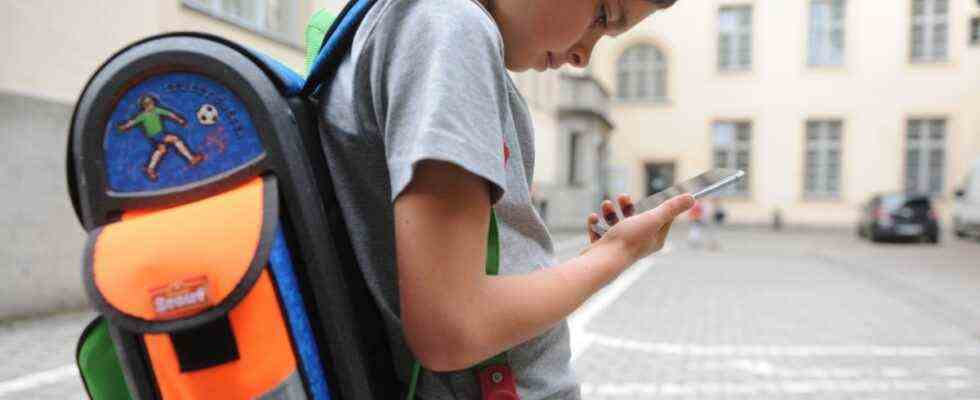The ban on mobile phones in Bavarian schools is to be relaxed: In future, schools should be able to decide for themselves whether or not to allow pupils to use their mobile phones privately during breaks or at lunchtime. Minister of Education Michael Piazolo (free voters) announced on Wednesday that the previous strict ban in the Bavarian school law would be relaxed. “The schools should be able to make their own decisions that are tailored and flexible,” said Piazolo of the German Press Agency. Specifically, the decision should lie with the so-called school forum, which includes the school management, teachers, parents and students.
The change in the law was given to the educational associations by the Ministry of Education on Wednesday for comments. The new regulation should come into force at the beginning of August if possible. In practice, it would therefore take effect after the summer holidays – whereby each school then has to decide for itself whether, how and where cell phone use is allowed, whether it is differentiated in terms of time, place or age. Piazolo does not want to set a deadline for this. But he said: “I assume that most schools will do the same.”
Currently, the use of mobile phones in Bavarian schools is generally prohibited – unless, in exceptional cases, a teacher expressly agrees. “In the school building and on the school grounds, mobile phones and other digital storage media that are not used for teaching purposes must be switched off,” says the Education and Training Act. Teachers can only allow exceptions in individual cases, in class or during breaks. The proposal for the new version now provides that the school management “in agreement with the school forum” may also generally allow the use of digital devices in the school building and on the school grounds. Elementary schools and elementary school levels at special needs schools are excluded. Individual decisions remain possible.
Piazolo emphasized: “The best solution is achieved when the entire school community is involved on site and an amicable solution is found.” That is the central finding that has been gained in a school experiment at a total of 135 schools in recent years. “We are strengthening the school’s personal responsibility. The goal is a high level of participation by teachers, students and parents – and then a great consensus.” This also has a positive effect on the school climate. However, not every school has to come up with what concrete regulations could look like. “We don’t want to leave the schools alone. From the school experiment, we have developed models for usage regulations that can be adopted,” said Piazolo. There will also be “no compulsion and no deadline” by when the schools have to take action after the law comes into force. “The schools should be able to find tailor-made solutions in peace,” he emphasized. Some certainly wanted to coordinate with neighboring schools.
Mobile phone rules could in future look like those at the middle school in Neunkirchen am Brand (Upper Franconia): “Privately, we only use our end devices before classes start and during the lunch break,” it says there. Only the 8th to 10th graders are allowed to use their mobile phones during free periods. Image and sound recordings are permitted for educational purposes at most, private recordings are prohibited. The devices may not be used on stairs, corridors or in toilets. In addition, the middle school has determined: “We always deliberately avoid using private end devices on the 1st and 15th day of the month in order to rethink our own media consumption.”
The use of mobile phones in schools had already been the subject of much discussion and, in some cases, disputes during the past legislative period. At a round table of the then Minister of Education Bernd Sibler (CSU) with teachers, parents and students, it became clear that there was a majority wish to move away from a blanket ban and to give the schools more design options. This led to the school trial with 135 schools, which started in the 2018/19 school year. So far, however, there has been no attempt to change the law. “It is necessary to regulate this now. The smartphone has long since become a constant companion, including among young people,” said Piazolo, emphasizing: “In terms of media education, such blanket bans as before no longer fit into the school landscape.”

